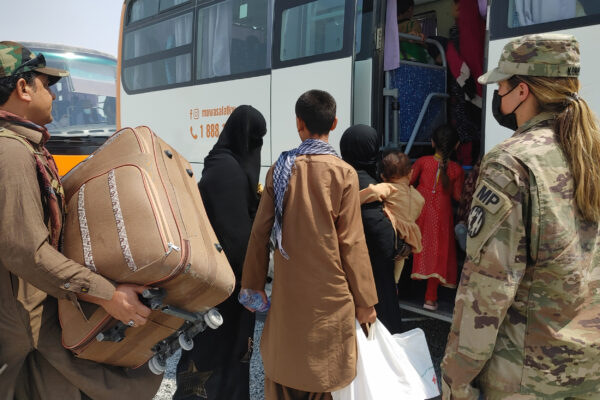
A Military Police Officer assists Afghan evacuees boarding a bus on a U.S. military base in Kuwait, 2021, for a final security check before their flight to their next destination. (Photo: U.S. Army Sgt. Connor Davis)
Several Veterans organizations have urged President Donald Trump to reverse his executive order suspending the U.S. Refugee Admissions Program, USRAP, expressing concern for Afghan interpreters and their families who supported U.S. military operations. The order, Realigning the United States Refugee Program, is set to take effect today, immediately halting the processing and relocation of USRAP refugees, including many who face threats due to their association with American forces.
Organizations such as Save Our Allies, Sheepdog Response, The Verardo Group, Diesel Jack Media, The Independence Fund, Mighty Oaks Foundation, and Special Operations Association of America signed a letter to Trump, stating the unintended consequences of the policy. While Special Immigrant Visas, SIVs, remain unaffected, advocates fear the suspension could indirectly harm those eligible for SIV status due to bureaucratic delays or additional restrictions.
“The current suspension of certain pathways for these allies may unintentionally penalize individuals who could be eligible for SIVs but do not currently hold them—not because they do not meet the qualifications, but because of the chaotic and disorganized nature of the withdrawal from Afghanistan under the previous administration,” the letter states.
The Veterans groups argue that the suspension could also adversely impact the mental health of Service Members who built strong bonds with Afghan partners. Many of these allies risked their lives assisting the U.S. Military, and many Veterans now feel a responsibility to protect them. They also stress that while they support Trump’s commitment to national security, the administration should ensure that Afghan allies are not unjustly left behind.
According to #AfghanEvac, a nonprofit dedicated to relocating Afghan allies, an estimated 10,000 to 15,000 fully vetted individuals remain stranded in Afghanistan, Pakistan, and other countries, awaiting flights to the U.S.
“We made a promise to our Afghan allies. Fulfilling that promise is not just about policy—it’s about honor and integrity,” said Shawn VanDiver, president of #AfghanEvac.
Tim Kennedy, a Green Beret and founder of Sheepdog Response, called on the administration to uphold its commitments: “Among the patriots I have served with are Afghan men who risked their lives to defend the freedom and American ideals we hold dear. It is our duty to protect them.”
The suspension of the refugee program leaves thousands in a dangerous limbo, including at least 200 immediate family members of active-duty U.S. Service Members. One paratrooper from the 82nd Airborne Division expressed his frustration, stating that his sister had been in the final stages of her refugee application before the order took effect.
“If this wouldn’t have happened, she would be out of the country within a month or two. Leaving U.S. Service Members’ families behind is totally unfair.”
Veterans and advocates are now looking to lawmakers and federal officials for solutions. Retired Gen. Frank McKenzie, former head of U.S. Central Command, acknowledged the responsibility the U.S. has toward its Afghan allies and remained optimistic that the administration could modify its stance.
The executive order allows for case-by-case refugee admissions at the discretion of the Secretary of State and the Secretary of Homeland Security, but it remains unclear how those exceptions will be applied. With thousands of Afghan allies at risk, Veterans groups continue to pressure the administration to carve out protections for those who stood alongside American troops in battle.












